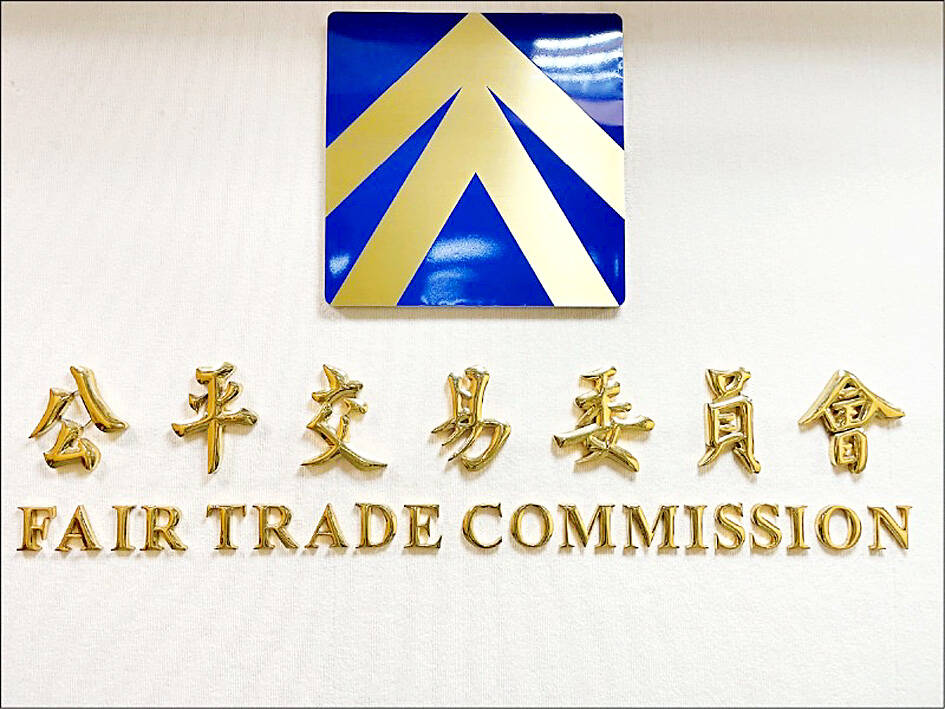Taiwan Mobile and Chunghwa Telecom were fined a total of NT$76 million (US$2.38 million) for jointly canceling incentives for subscribing to specific services after they led to a decrease of subscribers of services with higher tariffs, the Fair Trade Commission said yesterday.
The nation’s two largest telecoms in June and July 2018 separately offered a 4G service allowing subscribers to pay a monthly fee of NT$699, the commission said.
Internet access speed would not be reduced regardless of the amount of bandwidth subscribers used, it said.

Photo: Taipei Times
The telecoms also offered other incentives to attract subscribers, it said.
Subscribers of the monthly plan would not be charged voice communication fees if they made intra-network telephone calls. During the first six months of their contracts, they would only pay NT$666 per month for extra-network phone calls.
“Soon after the two telecoms made the monthly plan available, they found that a large percentage of new subscribers signed up to the service, which consequently led to a decline in subscribers of services with higher tariffs. They failed to increase revenue and attract more subscribers to services with higher tariffs after the introduction of the new monthly plan. They then wanted to cancel some of the incentives, move more subscribers to services with higher tariffs and decrease their financial loss in voice communication services,” the commission said.
Broadband services are controlled by three telecoms which offer very similar services, the commission said, adding that the pricing scheme was one of the strategies that they used to gain a competitive edge.
“As a telecom would risk losing its customers and market share if it unilaterally canceled certain incentives, Taiwan Mobile and Chunghwa Telecom then reached an agreement to jointly stop offering these incentives in October that year,” the commission said.
However, the concerted actions of the two telecoms caused Far EasTone Telecommunications to follow suit, and as a result none of the telecoms offered incentives to subscribers, the commission said.
As their actions weakened competition among telecoms and adversely affected the market, Chunghwa Telecom and Taiwan Mobile were fined NT$40 million and NT$36 million respectively for contravening the Fair Trade Act (公平交易法), the commission said.
The National Communications Commission (NCC) said in a statement that the Telecommunications Management Act (電信管理法) does not designate any dominator in the 4G service market.
As such, any promotional plan offered by telecoms does not need to be reviewed by the NCC, it said.
“We respect the Fair Trade Commission’s decision that Chunghwa Telecom and Taiwan Mobile had engaged in concerted actions,” the NCC said.
Taiwan Mobile and Chunghwa Telecom in separate statements said that it is regrettable that the Fair Trade Commission came to such a conclusion and would study taking legal action after receiving official documents of the ruling.
“Any change to the service plan we offered was made based on our business considerations, and we had neither motive nor necessity to engage in concerted actions with another telecom,” Chunghwa Telecom said. “It has been five years since we offered the monthly plan. The Fair Trade Commission might not be able to fully clarify and confirm relevant facts, resulting in a unfair and unfavorable judgement.”

Taiwan is stepping up plans to create self-sufficient supply chains for combat drones and increase foreign orders from the US to counter China’s numerical superiority, a defense official said on Saturday. Commenting on condition of anonymity, the official said the nation’s armed forces are in agreement with US Admiral Samuel Paparo’s assessment that Taiwan’s military must be prepared to turn the nation’s waters into a “hellscape” for the Chinese People’s Liberation Army (PLA). Paparo, the commander of the US Indo-Pacific Command, reiterated the concept during a Congressional hearing in Washington on Wednesday. He first coined the term in a security conference last

Prosecutors today declined to say who was questioned regarding alleged forgery on petitions to recall Democratic Progressive Party (DPP) legislators, after Chinese-language media earlier reported that members of the Chinese Nationalist Party (KMT) Youth League were brought in for questioning. The Ministry of Justice Investigation Bureau confirmed that two people had been questioned, but did not disclose any further information about the ongoing investigation. KMT Youth League members Lee Hsiao-liang (李孝亮) and Liu Szu-yin (劉思吟) — who are leading the effort to recall DPP caucus chief executive Rosalia Wu (吳思瑤) and Legislator Wu Pei-yi (吳沛憶) — both posted on Facebook saying: “I

The Ministry of Economic Affairs has fined Taobao NT$1.2 million (US$36,912) for advertisements that exceed its approved business scope, requiring the Chinese e-commerce platform to make corrections in the first half of this year or its license may be revoked. Lawmakers have called for stricter enforcement of Chinese e-commerce platforms and measures to prevent China from laundering its goods through Taiwan in response to US President Donald Trump’s heavy tariffs on China. The Legislative Yuan’s Finance Committee met today to discuss policies to prevent China from dumping goods in Taiwan, inviting government agencies to report. Democratic Progressive Party Legislator Kuo Kuo-wen (郭國文) said

The Ministry of Economic Affairs has fined Taobao NT$1.2 million (US$36,900) for advertisements that exceeded its approved business scope and ordered the Chinese e-commerce platform to make corrections in the first half of this year or its license would be revoked. Lawmakers have called for stricter supervision of Chinese e-commerce platforms and more stringent measures to prevent China from laundering its goods through Taiwan as US President Donald Trump’s administration cracks down on origin laundering. The legislature’s Finance Committee yesterday met to discuss policies to prevent China from dumping goods in Taiwan, inviting government agencies to report on the matter. Democratic Progressive Party